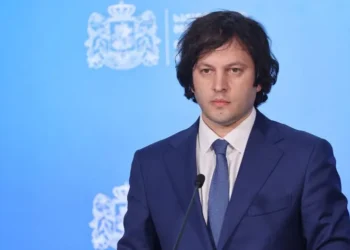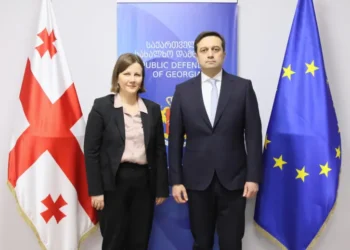Read Part I here.
Evaluation of events by the current geopolitical schools of thought mainly ranges between two extremes – idealistic and realistic. Consequently, today we have two large camps – those of “idealism” and “realism.” External political decisions and actions of Georgia’s international partners reach us through either of the two filters.
The advantage of “realism” and its comparison with “idealism” is a topic of frequent discussions. The objective of our article is not to draw parallels between the two, but before moving to the need of Georgian “realism,” we will briefly touch upon those “accusations” that can often be heard with regard to “realists.”
The main accusations against “realists” are that (1) they do not purportedly acknowledge international cooperation as well as the role of international institutions; (2) “realism” supports militaristic approach to challenges, and (3) disregards moral and ethical principles. Rejection of “exceptionality” of the US for the world order is also seen as a flaw of “realism” by “idealistic” expert circles of the United States of America, which further exacerbates the rivalry between the two aforementioned directions.
In the context of “natural moral,” the “realism” is perhaps a subject of substantiated and justified condemnation for some. However, an objective reasoning leads us to a different conclusion and we will try to briefly defend “realism.”
The point is that “realism” actually exposes all shortcomings of modern international relations as well as the inherent nature of a strong state, group or individuals to benefit from, to get hold of, to tailor to their needs and to misappropriate – this is a quality of the strong and it is understandable; especially at the time and under the conditions when supranational international structures are powerless to stand to global challenges and systemic crises while the “order” on the international arena, that time and again almost degrades into anarchy, creates a fertile ground for a spiraling growth of confrontation between various geopolitical forces.
As a result, it is a by-effect of realism that it increases the sense of insecurity, exposes the dearth of political reasoning and shortage of needed resources. All that causes unpopularity and unacceptance of “realists” among operating global elites and makes “realism” an object of open and constant attacks.
What attitude should we, Georgians, adopt under such conditions and how should we act, especially when an unfavorable environment that directly affects us has been formed without our involvement?
An instant reaction should probably be to look at our “muscles” and try to fan a national militaristic attitude. Such reaction is natural but it must not tempt us and must not turn concrete political decisions into reflexes of Hobbesian world.
It is obvious and cannot be argued that one of principled pillars of an effective state is its national army. At the same time, a modern defense and security system is not related to only issues of armament and military personnel. The main source of its effectiveness is a correct determination of a national idea, identity and prospects of resistance. Thus, the key to Georgian army’s combat motivation lies in organic symbiosis of government and people. Ejection of even one component from this triad cannot be comprehensively compensated by either modern missile launching systems or membership of alliances. We must primarily rely on ourselves and our own capacities while the reliance on own selves and own capacities will hugely increase the interest of supporters and allies towards us. As a result, we will move up from a requester to the rank of truly effective and long-term partner.
Assessment of issues by a reasonable, non-ideologized, “non-affiliated” standard will speed up the introduction of Georgian standard of “realism,” in which the interaction of the country and the world beyond it will be based on an understandable equation of the right balance and reciprocal obligations.
We think that two key objectives of such standard which we have already mentioned – greater security and greater welfare – will enable us to properly evaluate and correct this equation. A more correct or practically beneficial attitude than this can hardly be imagined in a de-ideologized and de-idealized new world order.
Peculiarity of Georgian “strategic depth”
As it has been already said, the strength of Georgian nation-state identity does not depend on a military component alone. We view it as a more complex phenomenon which we call Georgian “strategic depth.”
In general, the meaning of “strategic depth” has a military-geopolitical connotation. For such depth to emerge, a country, in order to neutralize an adversary or a threat, is focused on strengthening its influence (sometimes, hegemony) on bordering or even far-from-bordering territories. It is within the boundaries of this very depth that a hostile force or a risk must be contained and neutralized and their direct harmful effect on the territory and population avoided.
To demonstrate a “strategic depth” in a military-geopolitical sense, we can bring a number of examples, be it the Gaza Strip and control over the west Bank for Israel, or a recent prewar status of Nagorno Karabakh for Armenia (which is arguable for many), retaining influence over Ukraine by all means for Russia, or maintaining NATO’s role of effective containment, at least, in the European part of Eurasia for the United States. Stark differences in the aforenamed examples converge at one particular common point – to create and maintain a barrier for containing and restraining concrete threats, as you understand them, to the national security and to neutralize them until the threats reach and cross the national borders.
Clearly, in case of Georgia, it is absolutely groundless to speak about a “strategic depth” through a military-geopolitical prism. This even needs no explanation. We, however, believe that from the perspective of Georgian realism, the Georgian “strategic depth” may have its own shade. To minimize the threats, we may create a “depth” of our own construction in which the Georgian economic function and need will be considered and which will be determined by the Georgian culture.
We have repeatedly discussed the necessity of having the country’s authentic economic function and named various examples or systemic approaches (transnational energy projects courageously implemented in the late 1990s by the then government of Georgia). It was owing to those very projects that the country gained its voice not only in the regional economy, but beyond it too, which equally meant the increase in international attention to the country and the strengthening of its security. It is also a fact that the economic function requires regular revision and renewal. This is especially critical in the conditions of such fast-changing world where only past initiatives cannot pave the way for future no matter how impressive the past projects may seem. We also think that since the economic issue is closely linked to the positioning on geopolitical and security arena, a stable and diversified with transnational projects national economy bears a connotation of Georgian “strategic depth.” In particular, the more needed and beneficial for the business world we are, the higher the possibilities and prerequisites for maintaining stability and peace, preventing an unhealthy interference in the country’s domestic affairs.
Consequently, a constant revision and renewal of such economic function is in line with the strengthening and improvement of the Georgian security barrier – its “strategic depth.”
It may sound strange to some, but we would also assign the importance of protective barrier of Georgian “strategic depth” to the Georgian culture. Promotion of the national cultural treasure to the world and provision of more information about diverse Georgian art to those beyond the country (the best illustration of that is a celebration of Georgian polyphony in Vatican) must become an additional factor of protection and preservation of that treasure and art. We should ensure that the international community fully realizes that the Georgian culture is not the wealth of Georgia alone and it is one of unique pillars of the world’s cultural diversity. Consequently, the nation and country that gave birth and maintain this unique culture, must be a nation and country that require a special care and attention in terms of international security. By emphasizing such cultural barrier, we think, the “strategic depth” necessary for the nation-state security of Georgia will acquire a qualitatively new, additional dimension: for partners and friends of Georgia to give a higher consideration to Georgian interest and for opponents and adversary to view it as an additional circumstance for refraining to infringe this interest.
Separate specialized issues
Without taking timely decisions it is impossible to ensure strategic objectives and implement them in practice through the enactment of national ambition, as well as the positioning of the country. This topic is discussed time and again in media, expert and political circles and it seems difficult to add anything new to it.
In any case, we view this issue in the following way: a process of decisions making bearing Georgian ethnic-historic and cultural marks must be equally distinguished for a natural unity of effective state institutions and concrete leaders. Dull and unprincipled (sometimes, charismatic) leadership is not compatible with the Georgian national character, but at the same time, the containment of leadership with necessary qualities within the limits of smoothly running state institutions is in the nation-state interests.
In a small state, any public system, even distinguished for its exemplary qualities, has naturally set limits for resolving issues faced by the country. The essence of these limits has been broadly discussed in the previous publication. For the purpose of illustration, we will bring a short example: regardless of advantage of New Zealand in terms of doing business, the scale will still play a role and consequently, a particular company, to get foothold in the region, will prefer to enter the Indonesian market although it is riskier than the market of Zealand but has greater opportunities. This and other examples may be discussed extensively.
Therefore, under such limitations, a full use of existing potential in full is of particular importance in case of Georgia, the country that faces many internal and external challenges. The state management system which is still young and lacks a high political culture badly needs to familiarize itself with best practices of political alliances or coalitions, clear and transparent delegation of powers, autonomy of decision making, initiatives based on healthy meritocracy, depoliticization of “vital” structures once and for all. In short, this and many other things that will protect a decision-making process from “bureaucratic sclerosis” will turn the governance (with its ruling and opposition forces) into a true service provider and make a critical (and responsible) segment of society to feel themselves as full-fledged participant of the political process.
Art of using opportunity
For a country in such a difficult geopolitical situation as our is, the use of opportunities really amounts to the art. It is a fact that the fate has not allotted “lucky longitude” to Georgia, which directly affects the essence of risks and challenges posed to the country.
That is the reality that we cannot change, but we must try to get maximum benefit from it. Examples of success in difficult geopolitical geography are many. If anything, the history of Israel clearly demonstrates that a difficult neighborhood did not prove to be a hindrance for the development of Jewish state; Israel transformed a hostile environment into a constructive national stimulus of nation-state building during many decades. Clearly, the role of structural factors (geographic location, population, etc.) is great in the formation of nation-state organization. However, they can still be outweighed by correct strategic positioning and adequate quality of a decision-making process. A lot has been written and said about this and other related issues and we would name the work by Acemoglu and Robinson as one of most interesting and comprehensive sources (Why Nations Fail: The Origins of Power, Prosperity, and Povertyby Daron Acemoglu and James A. Robinson).
The topic of using opportunities in the context of relevant historic turmoil is not new in the Georgian reality. In the final part of this article we will offer the readers our own version in a generalized form and outline a few key principles: (1) in the conditions of rivalry of large states, a regular “stress-test” is necessary for the positioning of the Georgian state; (2) we should properly understand that any more or less successful positioning in a competitive environment requires an economic support – self-sufficiency and reliability of country’s economic system; (3) positioning of Georgia in the international context must not be narrowed to only military-political aspect, but must be seen in scientific and technological advancement of the country: this is tantamount to intellectual positioning of the country; (4) it is necessary, and we have touched upon that too, to aggressively promote a cultural resource and integrate it into the world heritage to a greater extent.
We believe that the entirety of these principles and, more importantly, use thereof with maximum efficiency is one of the optimal, modern Georgian modus operandi approaches to improving Georgia’s competitiveness and honing its adaptation abilities.
To cut a long story short, the room for open and meaningful discussion is vast. The key is not to miss, in such discussions, timeliness of adequate, correct actions at the right time. Shifting from excess focus on statics of power onto the creation of a long-term politics must become a common national demand.
Analysis by Viktor Kipiani, Chairman of Geocase














